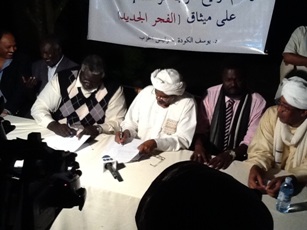Sudanese Islamist party leader signs New Dawn charter, blasts ruling NCP
January 31, 2013 (KHARTOUM) – The head of the Al-Wasat Islamic party, Youssef al-Koda, on Thursday joined the controversial New Dawn charter signed earlier this month in Uganda by Sudanese opposition parties and rebel groups battling Khartoum on multiple fronts.

Some of the signatories including the National Umma Party (NUP), Popular Congress Party (PCP) and Sudanese Communist Party (SCP) later distanced themselves from the charter saying they were rushed into it and expressed reservations about some of its clauses.
The Sudanese government launched a fierce media campaign against the deal and detained some of the parties’ representatives who attended the signing upon their return to Khartoum. Some officials even threatened to ban and prosecute all parties that joined the agreement unless they officially dissociate themselves from it.
Al-Koda’s signing ceremony was attended by the chairman of the Sudan People Liberation Movement North (SPLM-N) Malik Agar, head of the Justice and Equality Movement (JEM) Jibril Ibrahim and other opposition figures.
Speaking to reporters afterwards al-Koda attacked the NCP accusing it of corruption and exploiting religion to stay in power.
“[T]hey [NCP] ruled all this time as if they were mandated by Allah and not mandated by the people,” he said.
“This wrong understanding had terrible implications on public funds and the party had no segregation between its pocket and the government’s pocket….They wrongly thought after all this and their flawed beliefs that they were empowered by Allah,” he added.
Al-Koda arrived earlier this week in Kampala to hold talks on the charter with rebel leaders who make up the Sudanese Revolutionary Front (SRF).
The joint statement signed by al-Koda and Agar stated that citizenship should form the basis of all rights without regard to religion, race, colour, ethnicity, political or geographical affiliation.
They also emphasised the need to guarantee freedom of expression and belief under the rule of law, an independent judiciary, democracy, peaceful transfer of power and establishing a federal system of governance.
Issues in dispute are to be deferred for more discussions and preferably in the context of a constitutional conference, the statement said.
Al-Koda’s move will likely provide a psychological boost to anti-NCP forces given his status as an Islamist figure. However, it may not have any material effect on the political dynamics in the country.
He had already announced this month that he is moving to the ranks of opposition wanting to overthrow the regime led by president Omer Hassan al-Bashir.
At the time Qutbi al-Mahdi, a leading NCP figure slammed al-Koda’s decision saying that this makes his party a secular one in alliance with the Arab Baath and Communist parties.
But al-Koda responded to these remarks on his Facebook page saying that “the duty of reform and change” is not limited to Islamic movement or Islam as a religion.
“I did not join the opposition to teach them religion or transform them from secularism to Islamic [ideology] and to start with this was not the issue, but the issue is how to rid the country from the grip of people who ruined [the nation] and hurt it in the name of Islam”.
He also accused the government of prostituting Islam to extend its stay in power and questioned why the NCP’s meetings with the Chinese Communist Party are considered acceptable but not his alliance with opposition.
Al-Koda is considered to be a moderate figure who has been outspoken against Salafist hardline groups.
(ST)
